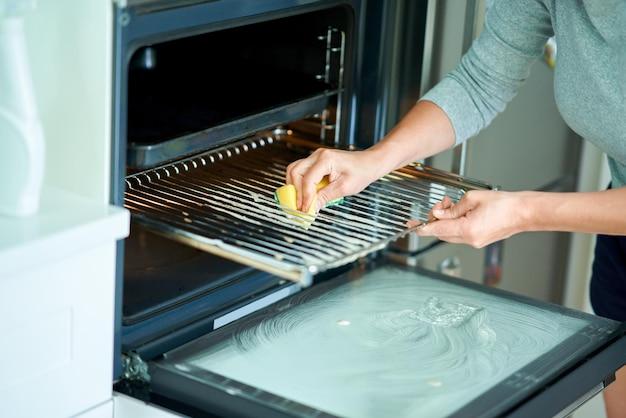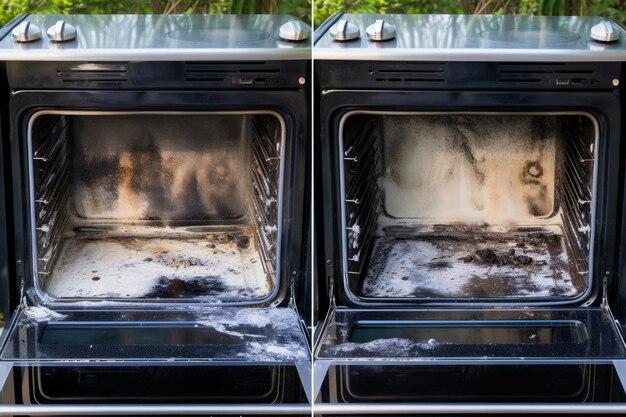Cleaning your oven can be a daunting task, especially after a particularly greasy or messy baking session. Many people turn to oven cleaners to help remove that stubborn grime, but what happens when it’s time to use the self-cleaning function? Can you simply rely on the oven’s self-cleaning feature, or do you need to take additional steps to ensure your oven is spotless and safe to use? In this blog post, we will explore the answers to these questions and more, providing you with all the information you need to confidently clean your oven and enjoy a fresh cooking experience.
We’ll delve into the potential dangers of oven cleaner residue, the steps to follow after using the self-cleaning function, and the duration of the oven door lock after cleaning. Additionally, we’ll tackle common concerns such as ventilation during self-cleaning, the compatibility of Easy Off with a self-cleaning oven, and the use of vinegar as a cleaning alternative. You’ll also find tips and tricks for cleaning the glass on your self-cleaning oven, as well as insights into what happens if you mistakenly use oven cleaner on it. So, let’s dive in and discover the best practices for achieving a clean and functional oven without any worries!
Can You Self Clean Your Oven After Using Oven Cleaner
So, you’ve just finished scrubbing your oven with an oven cleaner that promised to solve all your baked-on grease problems. Now, you’re left wondering if you can take it a step further and kick back while your oven does the self-cleaning work for you. Can you really have the best of both worlds?
The Self-Cleaning Conundrum
Before we dive into the nitty-gritty, let’s first understand the self-cleaning feature of an oven. This brilliant innovation uses high temperatures to literally bake off the stubborn grime and residue, leaving you with a sparkling oven interior. But here’s the catch: it’s not designed to tackle chemical residues left behind by oven cleaners.
Why Oven Cleaners Don’t Mix
Oven cleaners usually contain harsh chemicals that cut through grease and grime. While they are effective in removing that sticky, burnt-on mess, they can leave behind a residue that doesn’t play well with the self-cleaning process. These residues may react with the intense heat during self-cleaning, potentially releasing harmful fumes or even damaging the interior of your oven.
The Golden Rule: Read the Manual
When it comes to self-cleaning your oven, the general advice is to follow the manufacturer’s instructions. Each oven model is designed differently, and the manual is your best friend in determining which cleaning methods are safe and appropriate for your specific oven. So, grab a cup of coffee, sit back, and dive into the exciting world of oven manuals. Trust us, it’s riveting stuff!
Alternative Cleaning Methods
If you’ve already used an oven cleaner and are itching to give your oven the self-cleaning treatment, don’t fret! There are alternative cleaning methods that can still leave your oven looking spick and span.
Method 1: The Power of Baking Soda and Vinegar
Ah, the classic combo of baking soda and vinegar never fails to amaze us. Combine these household superheroes into a paste, spread it inside your oven, and let it work its magic for a few hours. Then, wipe away the paste and watch the grime vanish. It’s like a science experiment with a satisfying clean result.
Method 2: Steam It Out
For a gentler approach, you can opt for a steam cleaning method. Place a heat-resistant bowl filled with water and a squeeze of lemon juice inside your oven. Heat the oven to a low temperature and let the steam work its magic for about 30 minutes. Afterward, wipe down the interior, and voila! A clean oven without the need for a hazmat suit.
Prevention Is Better Than Cure
Now that you’ve cleaned your oven, it’s time to embrace preventive measures to avoid future battles with baked-on gunk. Consider using oven mats or liners to catch any spills or drips. Regularly wipe down your oven with a damp cloth or sponge after each cooking session. And hey, don’t forget to give your oven a pat on the back for a job well done!
In Summary
While the idea of letting your oven self-clean after using an oven cleaner might sound like a time-saving dream, it’s best to avoid mixing the two. Chemical residues from oven cleaners can react unfavorably during the self-cleaning cycle, potentially causing damage or releasing harmful fumes. Instead, explore alternative cleaning methods like baking soda and vinegar or the power of steam. Remember to consult your oven’s manual for the best cleaning practices. Happy cleaning, and may your oven forever smell of freshly baked cookies!
FAQ: Can You Self Clean An Oven After Using Oven Cleaner
Is oven cleaner residue dangerous
Oven cleaner residue can be potentially harmful if ingested or inhaled. It is important to thoroughly rinse the oven after using a cleaner to remove any residue to avoid any health risks.
What do you do after oven self-cleans
After your oven has completed the self-cleaning cycle, you should allow it to cool down completely. Once cool, you can remove the ash residue using a damp cloth or sponge. Remember to be gentle to avoid any scratches or damage to the oven interior.
How long does the oven door stay locked after self-cleaning
The oven door typically stays locked during the self-cleaning cycle and remains locked for a period of time afterwards until the oven cools down. This duration can vary depending on the oven model, but it is usually around 1 to 2 hours.
Should you open windows when the oven is self-cleaning
It is a good idea to open windows or ensure proper ventilation in the kitchen while the oven is self-cleaning. The self-cleaning process can generate heat and release fumes, and having good airflow helps to prevent any buildup of these fumes in your kitchen.
Will Easy Off damage a self-cleaning oven
Using Easy Off or any other oven cleaner on a self-cleaning oven is not recommended. The harsh chemicals in oven cleaners can damage the delicate components of a self-cleaning oven and interfere with its self-cleaning function. Stick to gentle cleaning methods specifically designed for self-cleaning ovens.
Is grill cleaner the same as oven cleaner
Grill cleaner and oven cleaner are not the same. Both are designed for different purposes and contain different ingredients. Using grill cleaner on an oven or vice versa may not produce the desired results and could potentially damage your appliance.
How do you clean the glass on a self-cleaning oven
To clean the glass on a self-cleaning oven, you can use a mixture of baking soda and water. Make a paste, apply it to the glass, and let it sit for a few minutes. Then, gently scrub the glass with a non-abrasive sponge or cloth. Rinse thoroughly with water and dry with a clean cloth.
What happens if you use oven cleaner on a self-cleaning oven
Using oven cleaner on a self-cleaning oven can lead to damage. Most self-cleaning ovens have a special coating that assists in breaking down and removing food particles during the self-cleaning process. The chemicals in oven cleaners can strip away this coating and may cause discoloration or other damage to the oven surface.
Can you use vinegar on a self-cleaning oven
Vinegar is a natural and safe option to clean a variety of surfaces, including a self-cleaning oven. You can mix equal parts vinegar and water, apply it to the oven interior, and let it sit for a while. Then, scrub gently with a sponge or cloth and rinse thoroughly.
How do you clean an oven after using oven cleaner
To clean an oven after using oven cleaner, rinse the interior thoroughly with warm water and wipe away any residue using a damp cloth or sponge. It’s important to remove all traces of the cleaner to avoid any potential harm or negative effects on future cooking.
Can oven cleaner make you sick
The ingredients in oven cleaners can be harmful if ingested or inhaled in large amounts. It is crucial to use these cleaners in a well-ventilated area and wear protective gloves and a mask if necessary. If you experience any symptoms after using oven cleaner, seek medical attention immediately.
Will oven cleaner residue burn off
Oven cleaner residue can burn off during the self-cleaning cycle or with subsequent cooking. However, it is best to remove all residue before using the oven to prevent any potential odors or smoke during cooking.
When can I use my oven after cleaning it
Once you have completely cleaned your oven after using an oven cleaner, you can use it as soon as it is dry. Make sure there are no remaining cleaner residues or odors before cooking in the oven to avoid any contamination of your food.
Why does the oven smell when self-cleaning
The self-cleaning process involves heating the oven to very high temperatures, which can cause any food particles or spills to burn and turn into ash. This process may create a temporary smell as it eliminates those residues. Proper ventilation during and after the self-cleaning cycle can help dissipate the odor.
How do you get the smell out of oven cleaner after cleaning
To get rid of the smell left by oven cleaner after cleaning, you can try placing a bowl of vinegar or baking soda inside the oven and leaving it overnight. These natural odor absorbers can help neutralize any remaining odors. Alternatively, you can wipe the interior with a damp cloth soaked in lemon juice, which leaves a fresh citrus scent.
How do you get rid of self-cleaning oven fumes
To minimize self-cleaning oven fumes, ensure proper ventilation by opening windows or turning on exhaust fans during the self-cleaning cycle. You can also place a fan near the oven to help circulate the air and disperse the fumes.
Is the oven safe after cleaning
Yes, the oven is safe to use after cleaning, provided that you have followed the proper cleaning procedures and rinsed any cleaner residue thoroughly. Remember to always double-check for any remaining residue or odors before cooking to maintain a safe and pleasant cooking environment.
How do I get burnt stuff off the bottom of my oven
To remove burnt debris from the bottom of your oven, you can create a paste using baking soda and water. Apply the paste to the affected areas and let it sit overnight. The next day, gently scrub the debris with a sponge or cloth and rinse thoroughly. Stubborn stains may require multiple attempts or the use of a non-abrasive oven cleaner.
Can self-cleaning oven fumes hurt you
Self-cleaning oven fumes can be irritating if inhaled in large quantities, especially to individuals with respiratory issues or sensitivities. It is important to have good ventilation during the self-cleaning process and avoid direct exposure to the fumes. If you experience any discomfort or respiratory symptoms, seek fresh air and medical assistance if necessary.

